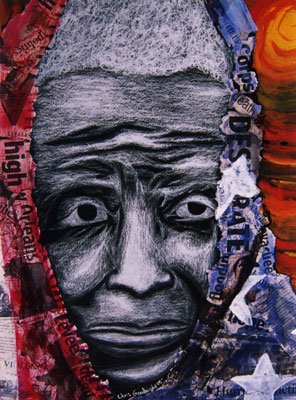All Nonfiction
- Bullying
- Books
- Academic
- Author Interviews
- Celebrity interviews
- College Articles
- College Essays
- Educator of the Year
- Heroes
- Interviews
- Memoir
- Personal Experience
- Sports
- Travel & Culture
All Opinions
- Bullying
- Current Events / Politics
- Discrimination
- Drugs / Alcohol / Smoking
- Entertainment / Celebrities
- Environment
- Love / Relationships
- Movies / Music / TV
- Pop Culture / Trends
- School / College
- Social Issues / Civics
- Spirituality / Religion
- Sports / Hobbies
All Hot Topics
- Bullying
- Community Service
- Environment
- Health
- Letters to the Editor
- Pride & Prejudice
- What Matters
- Back
Summer Guide
- Program Links
- Program Reviews
- Back
College Guide
- College Links
- College Reviews
- College Essays
- College Articles
- Back
Katrina’s Lesson MAG
The pictures are deceiving. In them I see blankets hung from trees, worn pictures cast aside, garments torn to shreds, and houses with only foundations remaining. In reality, these pictures are of priceless quilts knitted by a deceased great-grandmother, decades of visual reminders of weddings and births. The shredded clothes are future prom dresses and previous wedding gowns, expensive suits and homemade costumes. The foundations weren’t the remnants of houses. They were the remnants of homes.
I’d watched the news, I’d seen the pictures, and I’d read the newspaper, but it was all too unfathomable. As the team of 50 students from my church neared our destination of Pass Christian, Mississippi, the signs of the hurricane became more prominent.
Upon arrival our team cleared out a lot where a home had once stood. We chopped down mangled trees and removed anything and everything that could be imagined in a home. All the items appeared to have had special meaning to their owners, and we were piling them up for a landfill. It quickly became a game to see who could discover the “coolest” or “weirdest” item. We pulled out televisions, computers, toilets, undergarments, Christmas decorations, Mardi Gras beads, silverware, and trophies. We were throwing away people’s lives and prized possessions. The reality of what we were doing was yet to hit me.
One night we were cleaning up after dinner at “God’s Katrina Kitchen,” where a preacher had spoken to all of us. He engraved a horrifying picture into our minds when he said, “If you don’t understand the power and destruction of Katrina, then I can take you less than a mile down the road where we’ve got three semi-trailers filled with unclaimed bodies!” This statement was a slap in the face. Suddenly I understood the horror and emotions wrapped up in this disaster. My breathing become difficult. I felt sick with guilt for the “game” we’d played.
I realized that although I’d come on this trip to help, the real reason was to make me look and feel good. I loved being the “good” person. After that night, I focused on helping the victims, and not on placing myself in the spotlight.
For example, the next day we were assigned to tear up tile and pull rusty nails from the ceiling of an hurricane-ravaged building that would serve as a new clothing distribution center. My small group of ten girls worked in the mold-infested conditions for hours. I’d never worked so hard. I was either twisting a hammer to pry out rusty nails or beating the aged tile with a hammer (or two). I had layers of blisters and callouses on my hands by the time we were done, but I didn’t complain. I kept myself last and others first.
When I told my mom about my realization, she said, “So is that why your phone calls changed?”
“What do you mean?”
“Before you got to Mississippi, I could tell that your heart wasn’t in the right place. You would phone to tell me about how much fun you were having and all the new friends you were making. You sounded like you were at camp! Then, halfway through the weekend, the topics of our conversations changed from all of the fun to what you’d done to help and how you hoped you were making a big enough difference.”
My mother heard the change in my heart and helped me to realize them too. I continue to be involved in volunteer work since I returned from Mississippi, and I like helping others for their benefit, not mine. Katrina may have caused so much destruction, but in the midst of its horror, it helped me learn this valuable lesson, Katrina’s lesson.

Similar Articles
JOIN THE DISCUSSION
This article has 1 comment.

0 articles 0 photos 12292 comments